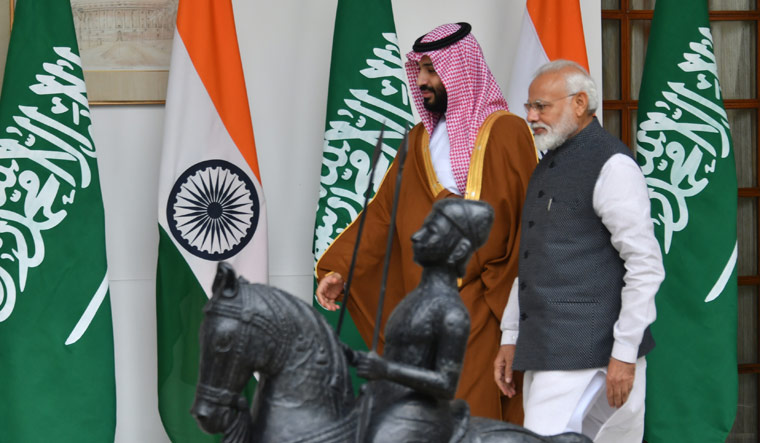Saudi Crown Prince Mohammed bin Salman touched down in Beijing to meet President Xi Jinping on the last leg of his Asia tour which began with his visit to Pakistan.
The crown prince, who has had a rough six months owing to dissident journalist Jamal Khashoggi's death, seems to be in an all-out effort to win new friends in the east. The west has been critical of him for his alleged hand in the death of the journalist at the Saudi Arabia consulate in Istanbul.
In Pakistan, the prince was given a red carpet welcome, with Prime Minister Imran Khan himself chauffeuring him from the airport. Pakistan and Saudi Arabia have long shared a close friendship which is based on religious, cultural, social, economic and political factors. One of the areas of interest of the Prince lies in the viable Gwadar Port in Balochistan, the centre of China-Pakistan Economic Corridor. Besides this, army personnel from Pakistan are sent to the kingdom for training. Part of Pakistani army had stayed back in Saudi during the Iran-Iraq war, indicating that the relationships between the two military forces went beyond routine training.
The prince's visit has brought a huge relief for Pakistan which is facing a financial crunch and has been pushed to reach out to the International Monetary Fund for a bailout. Saudi has signed investments worth $20 bn in Pakistan.
Also read
- The Kerala Story: Malayalis crowdsource about Rs 30 Cr in four days to save man from gallows in Saudi Arabia
- Ranveer Singh, Diane Kruger to be honoured at Red Sea Film Festival
- Saudi prince says Palestinians should opt for civil disobedience that ended British rule in India
- Saudi praises Qatar for fantastic FIFA World Cup, drops no hint on alcohol availability for fans
India, on the other hand, was keen on getting the prince's cooperation to tackle terrorism especially in the wake of Pulwama attack. The importance India gave to his visit was evident when Prime Minister Narendra Modi personally went to the airport to receive him. Saudi Arabia agreed to share intelligence with India in fighting terrorism, but chose to remain silent on Pakistan. The large Indian workforce in Saudi and the Gulf country's investment possibilities in India were other areas of interest. The prince said he sees opportunities worth $100 bn in India.
Mohammed bin Salman may have got a royal welcome in both India and Pakistan, but the dynamics change when he enters China. He was greeted by Chinese deputy chairman of the advisory and political council Khi Li Fung, Saudi ambassador to China Turki Al Madi, and Chinese ambassador to Saudi Arabia Li Hua Xin. He will be meeting Xi Jinping at his presidential palace and not at a neutral venue.
The prince's visit is seen as a major fillip to China's attempt to pull Saudi away from the American block. China and the US have had tense relations recently after President Donald Trump announced heavy tariffs on Chinese goods. For Saudi, strengthening ties with China would be a way of power politics and a reply to its disgruntled western allies. Besides this, it could also fortify his image as a leader in his own country.
His meeting with Jinping may or may not involve talks of weapons or missiles. But it does indicate China walking the tightrope between Saudi and Iran. China had recently hosted Iran foreign minister Mohammad Javad Zarif. Ties with both Saudi and Iran are equally important to an ambitious and resource-hungry China who wants to ensure that its Belt and Road Initiative is a huge success.



